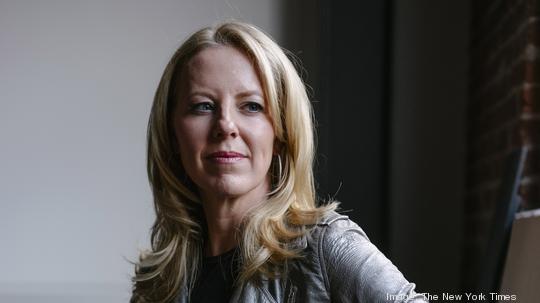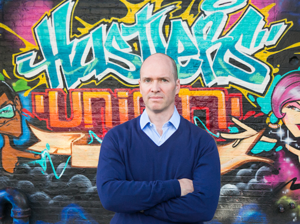
For our annual Economic Forecast issue, we asked our reporters to delve into their crystal balls, highlighting the important trends and people to watch in 2022. Here's our take on tech and innovation.
Web3 and the metaverse are hot
It could take years, perhaps decades, for a critical mass of the internet to run on blockchain or other decentralized protocols. And it's likely that we'll see not one but many iterations of metaverses emerge depending on who's building it including Meta (aka Facebook), Epic Games, Roblox and Microsoft.
But so-called web3 startups are hot right now and investors are jumping all in. There are 33 startups working on web3 or metaverse products in the Bay Area, according to Crunchbase. Some startups in this space aren't raising traditional VC funds, though. Instead, they are selling tokens to community members and in some cases, like with Braintrust, venture firms are directly buying tokens in lieu of traditional equity-based raises.
Braintrust is a community owned freelancing platform that has raised $124 million through token sales, most of which were bought by Tiger Global Management and Coatue this year. Braintrust is part of an emerging area of so-called DAOs: decentralized autonomous organizations that are akin to digital user-owned cooperatives where one token bought equals one vote on governance issues.
Other startups aren't explicitly dedicated to web3 or the metaverse but are building products that will be useful in that space. One such startup is Stytch which is developing passwordless identity authentication products. It raised more than $126 million this year and was most recently valued at $1 billion.

Valuations becoming even more divorced from revenue
VCs are flush with cash to toss around and mega-rounds of $100 million or more are also happening more frequently. But when it comes to valuations, revenue is taking a back seat to future potential, or as former Bloomberg Tech reporter Eric Newcomer calls it, "softer engagement metrics" like early adoption numbers. Median valuations skyrocketed this year, according to a third quarter report from PitchBook. The median early-stage valuation hit $53 million in the September quarter this year which is a 76% jump over 2020.
Investors will compete to differentiate themselves beyond cash
There's never been more money flowing through Silicon Valley, and VC partners keep telling me that cash is no longer a differentiating factor for founders. It's about what else investors can bring to the table (along with plenty of cash, of course), like mentorship and specialized expertise. TechCrunch's Natasha Mascarenhas is looking for what she calls big "activation energy" from the broader tech and investment community. Last year, Christine De La Rosa launched The People's Group Fund as well as an accelerator for entrepreneurs of color in the cannabis industry to provide more access not only to funding opportunities but also to mentorship. "Even if we decide not to invest in them, they're ready" now for other investors, De La Rosa told me. Female investors, such as DDX Ventures founder Michele Colucci, are also talking about moving beyond mentorship to becoming advocates for the founders in their portfolios. Getting connected to the right people is just as important as raising cash.
NFTs may be more than a pandemic craze
So-called nonfungible tokens have been around for a few years now but really exploded during the pandemic. One of the earliest NFT platforms was CryptoKitties which launched in 2017. Over the past couple of years the blockchain-fueled assets have been used by artists (see this JPEG that sold for over $69 million), Jack Dorsey (he sold he first tweet as an NFT for $2.9 million) and gamers (Axie Infinity allows users to create, breed, battle and sell axolotl-inspired avatars). NFTs can exist as one-off creations that simply verify an asset's authenticity of ownership such as an NFT for the source code that launched the World Wide Web which sold for $5.4 million in June. They can also be attached to collections within exclusive digital worlds such as the Bored Ape Yacht Club and Gutter Cat Gang. The Information even predicts that YouTube will launch an NFT marketplace for creators. There are around two dozen startups in the Bay Area working on all things NFT, according to Crunchbase.
The SPAC frenzy could cool down
SEC Chair Gary Gensler wants the agency to set stricter rules for special purpose acquisition companies, or SPACs, as soon as April. The so-called blank check companies have become more popular over the past few years as an alternative to traditional IPOs, but regulators are worried about loopholes in the process that give insiders special access and potentially put regular investors at financial risk. SPAC deals reportedly make up 60% of all public offerings now. More than two dozen Bay Area companies got scooped up by SPACs this year, including Hims & Hers, ChargePoint, MetroMile and SoFi.
People to Watch
Katie Haun, Andreessen Horowitz
The a16z partner is leaving the powerful Silicon Valley venture capital firm this year to launch her own crypto and web3 focused venture firm in which a16z will be an LP. Haun is considered to be one of the foremost experts in those space and is a former federal prosecutor who worked on cybercrime and fraud cases. She was also recently part of a team of representatives sent by a16z to pitch draft legislation to regulators in DC that would be favorable to cryptocurrency investors. Haun is currently on the boards of NFT marketplace OpenSea and cryptocurrency platform Coinbase.

Kimberly Bryant, Black Girls Code
The founder of Black Girls Code was ousted as chief executive of the Oakland-based non-profit right before Christmas. She launched the organization in 2011 to create opportunities for young Black girls to learn practical tech skills and create a pipeline for more women of color to work in tech. In a statement, the board said it had placed Bryant on paid administrative leave pending an investigation in unspecified allegations of misconduct. On Dec. 21, Bryant tweeted: "so it’s 3 days before Christmas and you wake up to discover the organization YOU created and built from the ground up has been taken away by a rogue board with no notification." It's unclear how long the investigation will take or whether Bryant might be reinstated.

Parag Agrawal, Twitter
Twitter's new CEO has been with the company for a decade but has only been the top executive since late November, when Jack Dorsey unexpectedly stepped down. Agrawal was promoted to CTO in 2017 and also oversaw Bluesky, Twitter's decentralized internet project, since 2019. He is taking over the company at a time when tech companies are under increasing scrutiny from regulators around the world regarding issues such as alleged censorship and bias, disinformation campaigns, harassment, terrorism, illegal content, electoral processes and global tax structures.

Tom Chi, At One Ventures
A founding team member of Google X, Chi co-founded the San Francisco venture firm At One Ventures with in 2019 with Laurie Menoud and Helen Lin. Their goal? To destroy industries that are destroying the planet. In October the firm announced its first fund of $150 million but their ambitions are much, much bigger. Over the next decade, they want to invest $1 billion into climate change solutions and have already invested in 21 startups which include companies developing robotic farming techniques, compostable foam, cell-cultured seafood and CRISPR for reviving extinct species.
Leshika Samarasinghe, Twine Ventures
Hired by Google's product and engineering team in the early 2000s, Samarasinghe jumped into investing a decade ago and in 2021 launched her own firm, Twine Ventures, that will focus on early-stage investments in health, climate and finance. First-time venture funds are on the rise after declining for a few years, according the WSJ, and they're giving established firms some healthy competition over investments and talent. Emerging firms also frequently outperform the general market, are more diverse and tend to invest in sectors that have historically been overlooked. “Life is short. I better work on things I care about and do it in the way I see fit,” Samarasinghe told the Journal in September.








